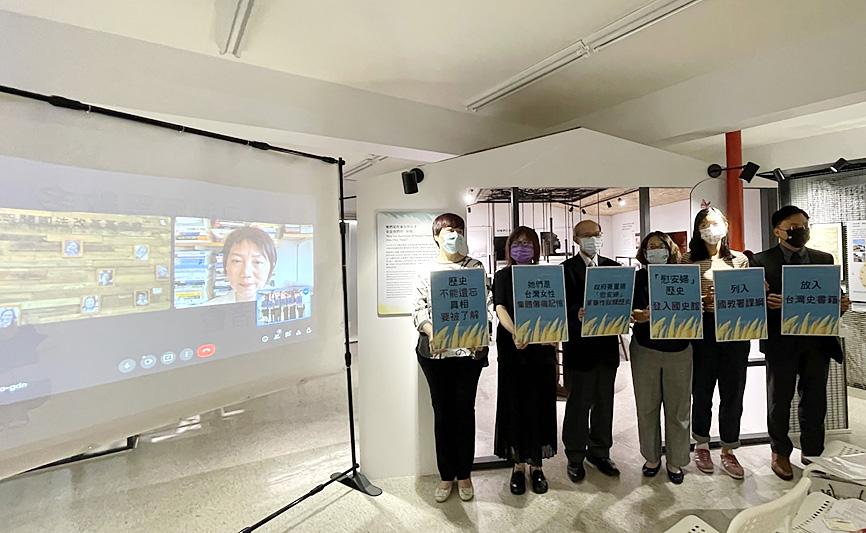Taiwan’s history of “comfort women” should be added to Academia Historica’s archives and the national curriculum to mark International Memorial Day for Comfort Women tomorrow, the Taipei Women’s Rescue Foundation and the Judicial Reform Foundation told a news conference in Taichung yesterday.
The existence of comfort women in Taiwan during World War II has largely been ignored, the groups said.
“History must not be forgotten and the truth must be known,” they said. “The history of comfort women as military sexual slaves during World War II belongs to the painful collective memory of Taiwanese women.”

Photo: CNA
To better understand attitudes toward public education about the issue, the rescue foundation last month conducted an online survey.
Of the 677 respondents, 99 percent knew about Taiwan’s history of comfort women, Taipei Women’s Rescue Foundation chief executive officer Tu Ying-chiu (杜瑛秋) said.
However, asked whether schools teach this history, 46.7 percent said they did not know and 53.2 percent said they do not, Tu said, adding that most people said they learned about the issue from documentaries or news programs.
More than 90 percent of respondents said they support including the issue in history books and the national curriculum, and amending the euphemistic name to specify that they were “military sex slaves,” Tu said.
Only a few textbooks mention comfort women, and the only place it appears in the national curriculum is in the “gender and history” section for Grade 12, the groups said, adding that some people erroneously believe the women acted voluntarily.
Few published histories of Taiwan mention the issue either, while Academia Historica has no dedicated section in its records, they said.
It is not only a part of national history, but also an important chapter in gender and human rights, the groups said, calling on the government to give more attention to the role of women in history.
South Korean advocates designated Aug. 14 an international day of remembrance for comfort women to honor the first public testimony by a survivor, Kim Hak-soon, delivered on that day in 1991.

Taiwanese can file complaints with the Tourism Administration to report travel agencies if their activities caused termination of a person’s citizenship, Mainland Affairs Council Minister Chiu Chui-cheng (邱垂正) said yesterday, after a podcaster highlighted a case in which a person’s citizenship was canceled for receiving a single-use Chinese passport to enter Russia. The council is aware of incidents in which people who signed up through Chinese travel agencies for tours of Russia were told they could obtain Russian visas and fast-track border clearance, Chiu told reporters on the sidelines of an event in Taipei. However, the travel agencies actually applied

Japanese footwear brand Onitsuka Tiger today issued a public apology and said it has suspended an employee amid allegations that the staff member discriminated against a Vietnamese customer at its Taipei 101 store. Posting on the social media platform Threads yesterday, a user said that an employee at the store said that “those shoes are very expensive” when her friend, who is a migrant worker from Vietnam, asked for assistance. The employee then ignored her until she asked again, to which she replied: "We don't have a size 37." The post had amassed nearly 26,000 likes and 916 comments as of this

New measures aimed at making Taiwan more attractive to foreign professionals came into effect this month, the National Development Council said yesterday. Among the changes, international students at Taiwanese universities would be able to work in Taiwan without a work permit in the two years after they graduate, explainer materials provided by the council said. In addition, foreign nationals who graduated from one of the world’s top 200 universities within the past five years can also apply for a two-year open work permit. Previously, those graduates would have needed to apply for a work permit using point-based criteria or have a Taiwanese company

The Shilin District Prosecutors’ Office yesterday indicted two Taiwanese and issued a wanted notice for Pete Liu (劉作虎), founder of Shenzhen-based smartphone manufacturer OnePlus Technology Co (萬普拉斯科技), for allegedly contravening the Act Governing Relations Between the People of the Taiwan Area and the Mainland Area (臺灣地區與大陸地區人民關係條例) by poaching 70 engineers in Taiwan. Liu allegedly traveled to Taiwan at the end of 2014 and met with a Taiwanese man surnamed Lin (林) to discuss establishing a mobile software research and development (R&D) team in Taiwan, prosecutors said. Without approval from the government, Lin, following Liu’s instructions, recruited more than 70 software